Shakespeare Memes
Tuesday, April 23rd, 2019Happy 455th Birthday to Shakespeare!
In honor of the occasion, I present… Shakespeare Memes!
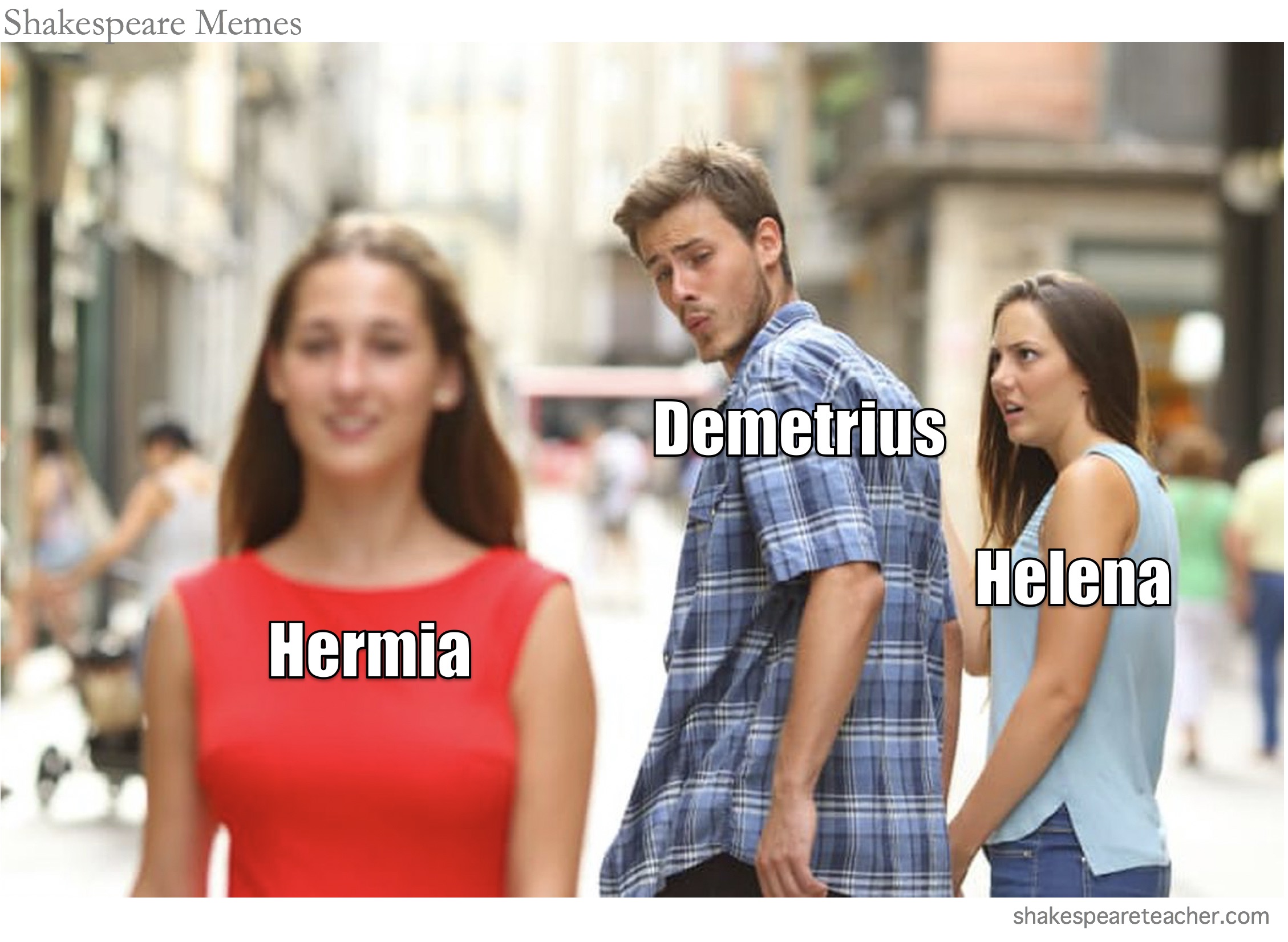

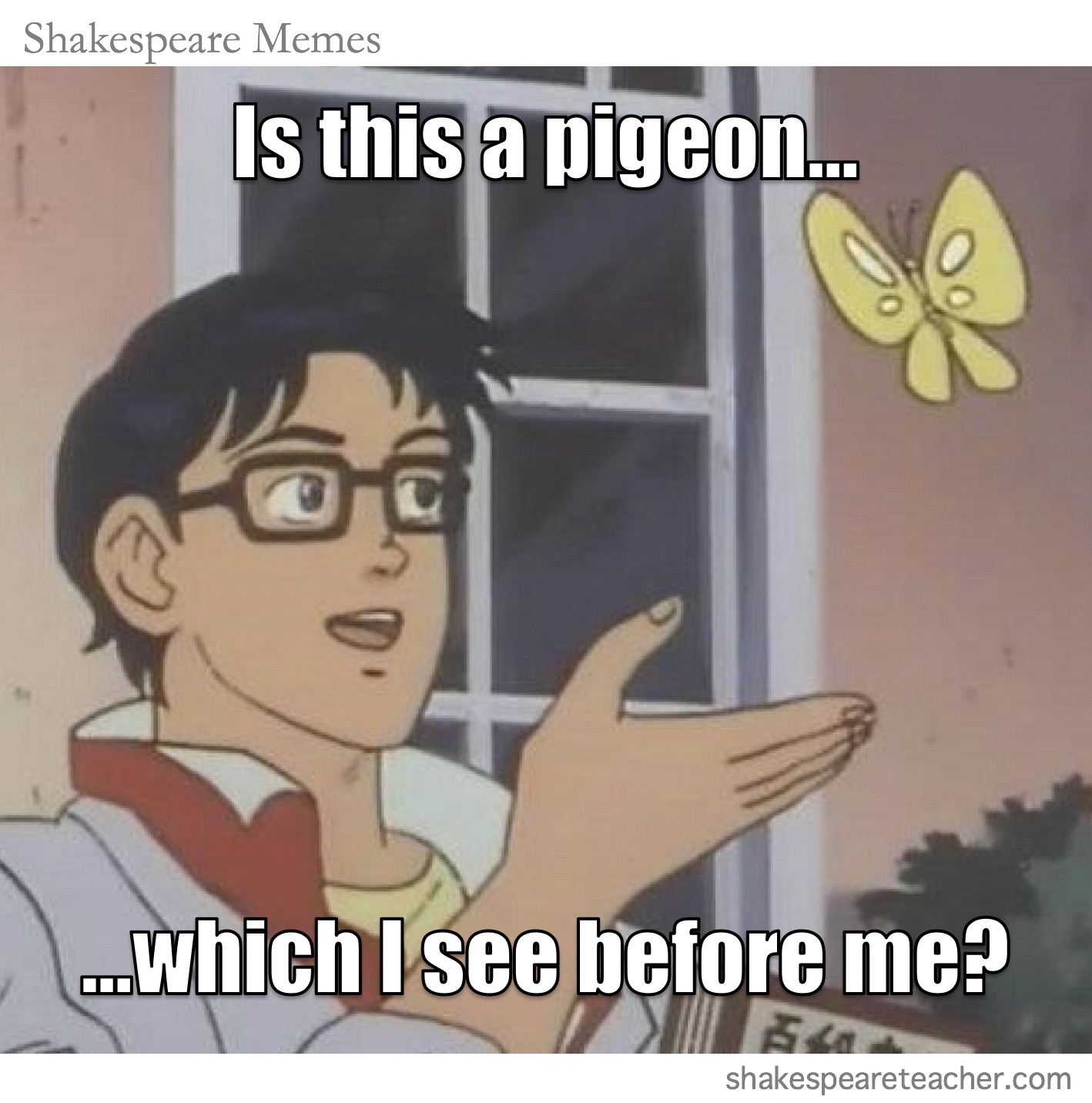

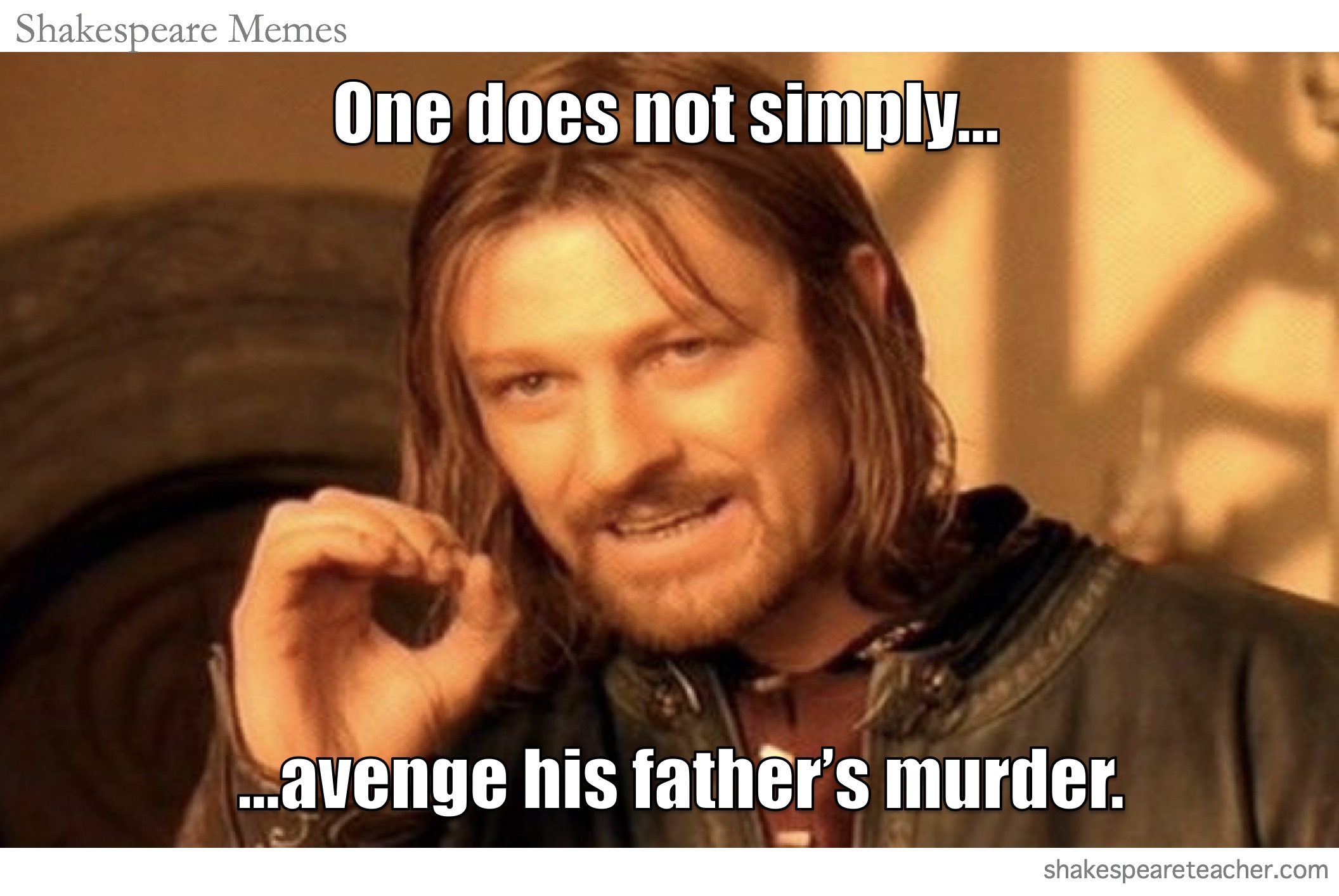
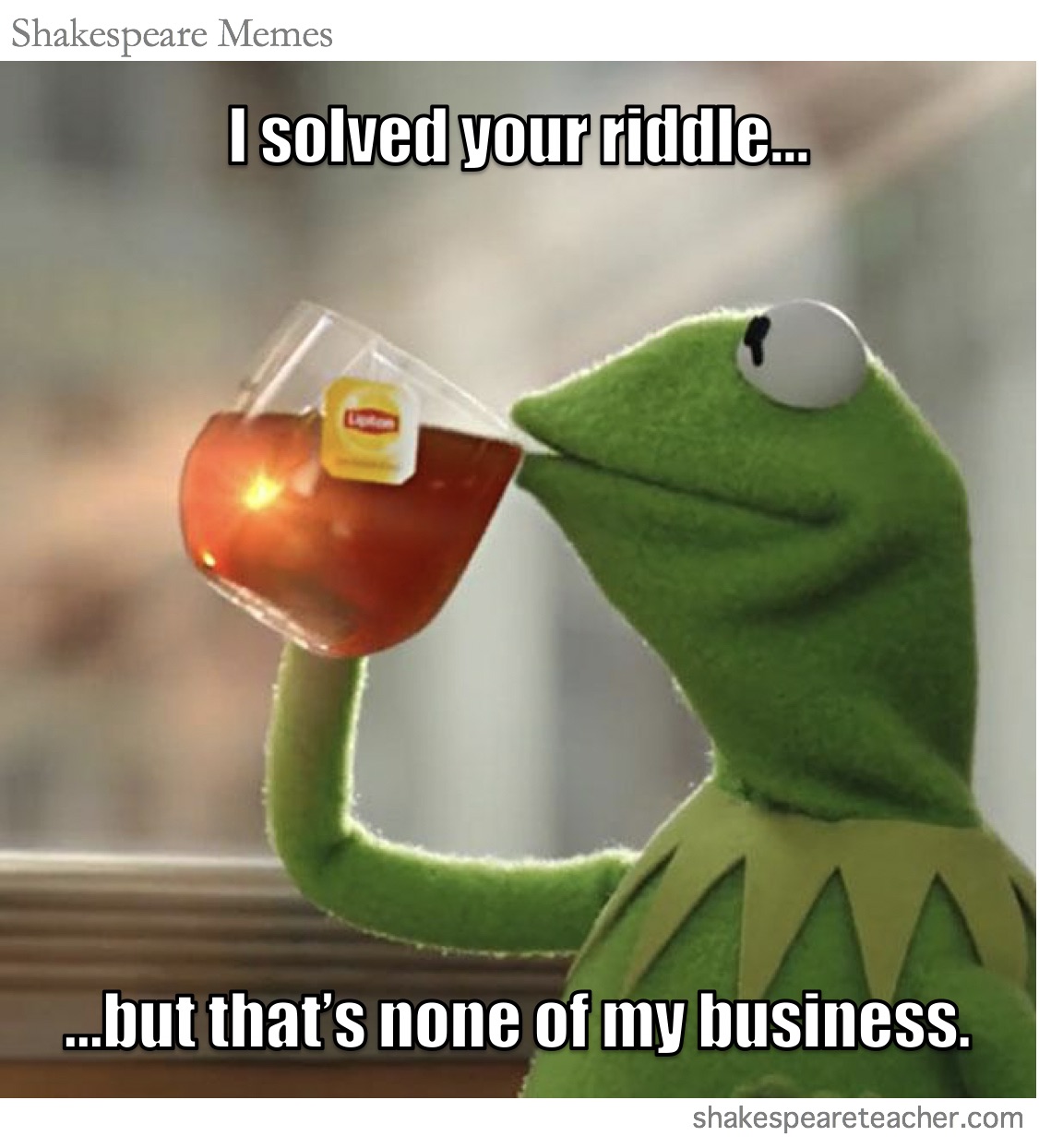

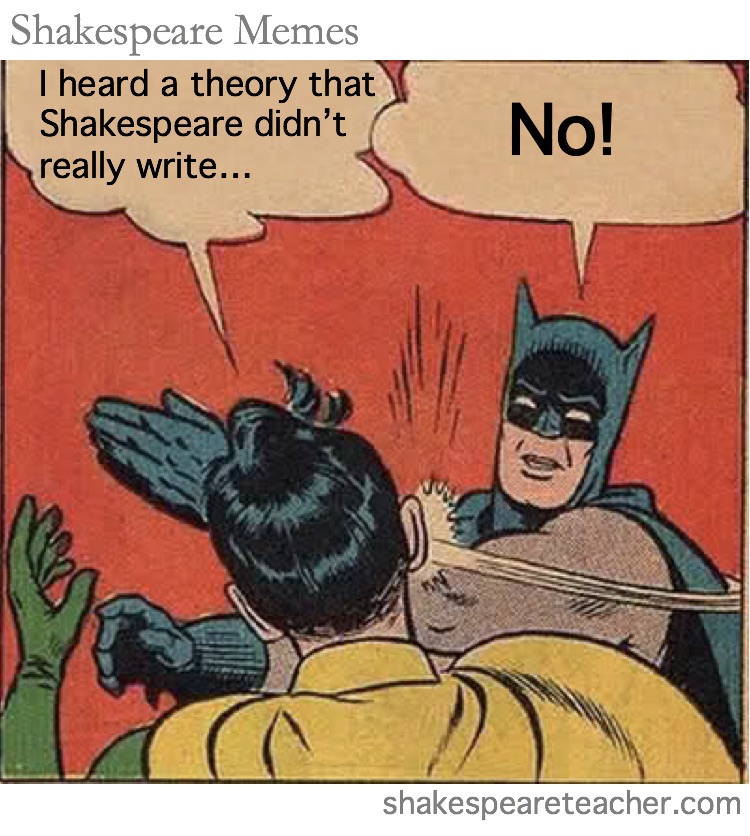
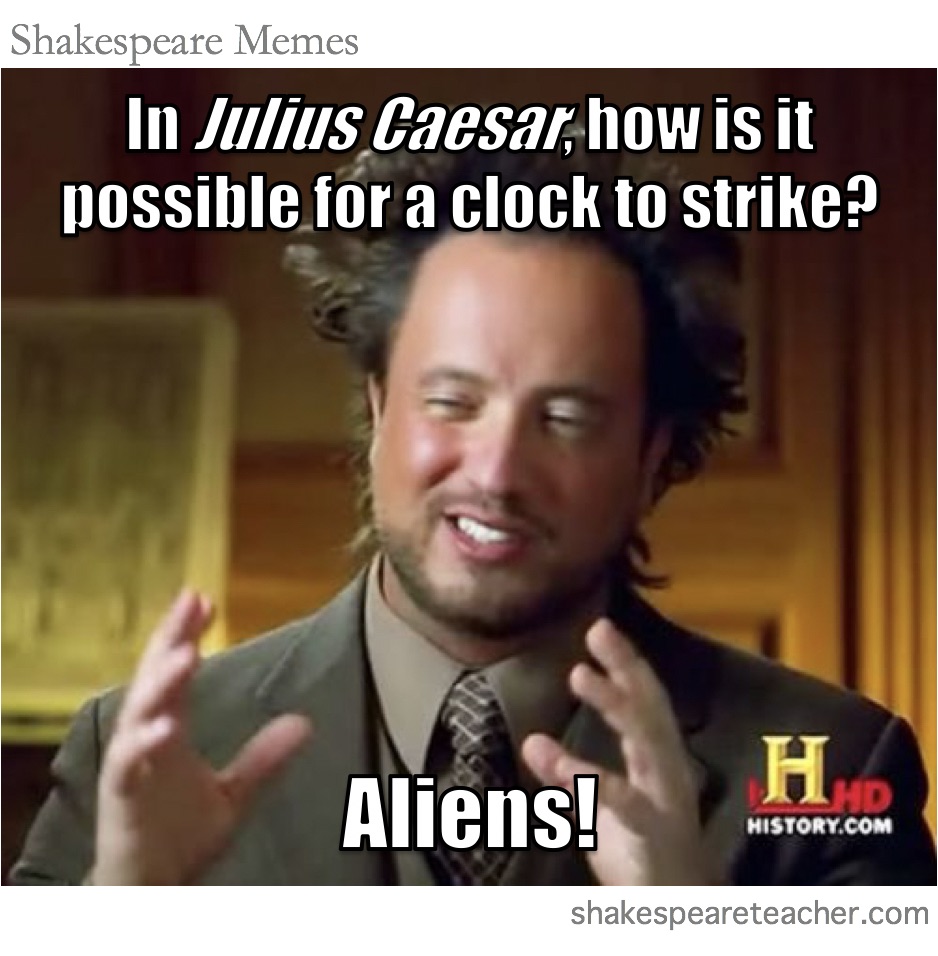
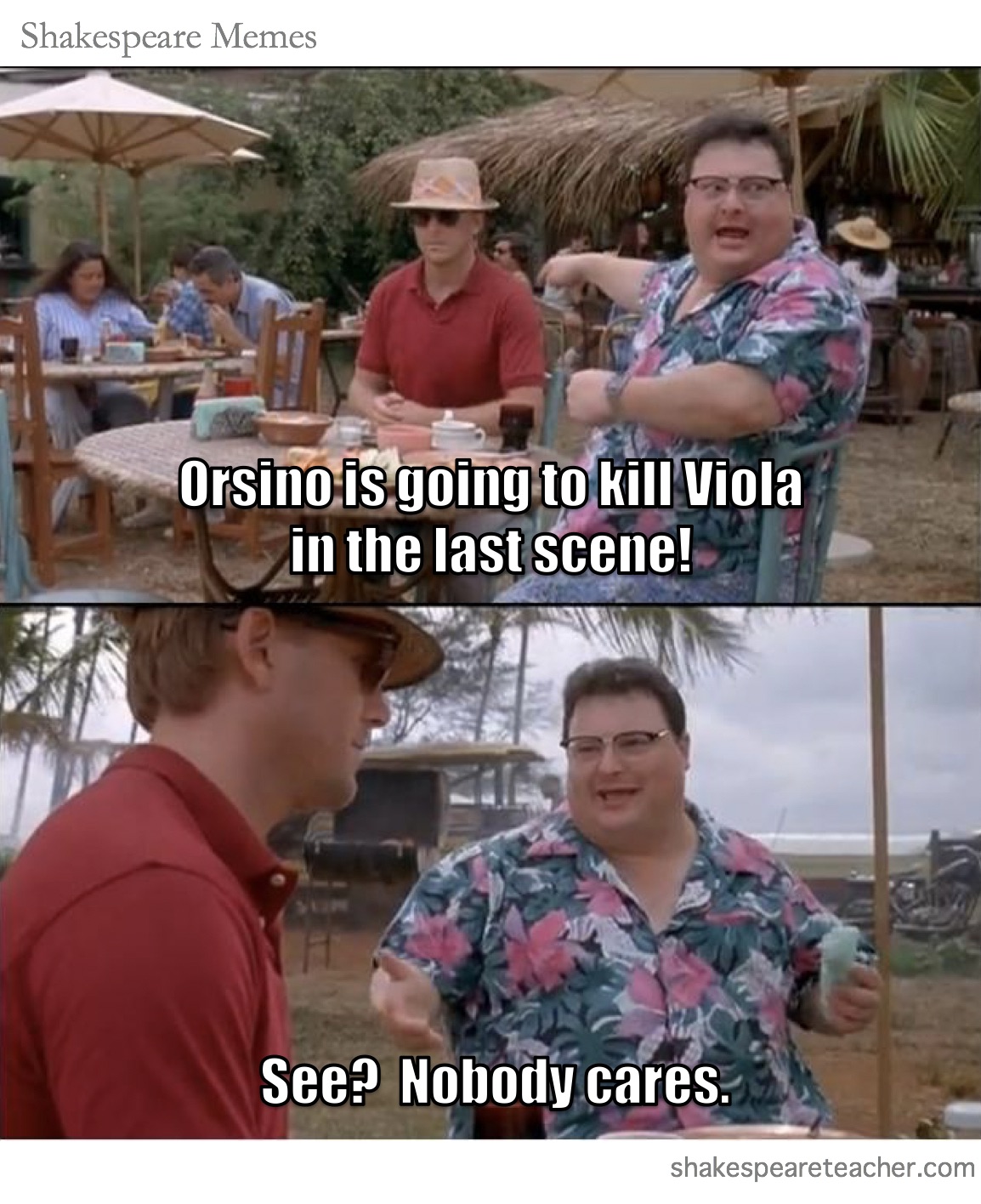
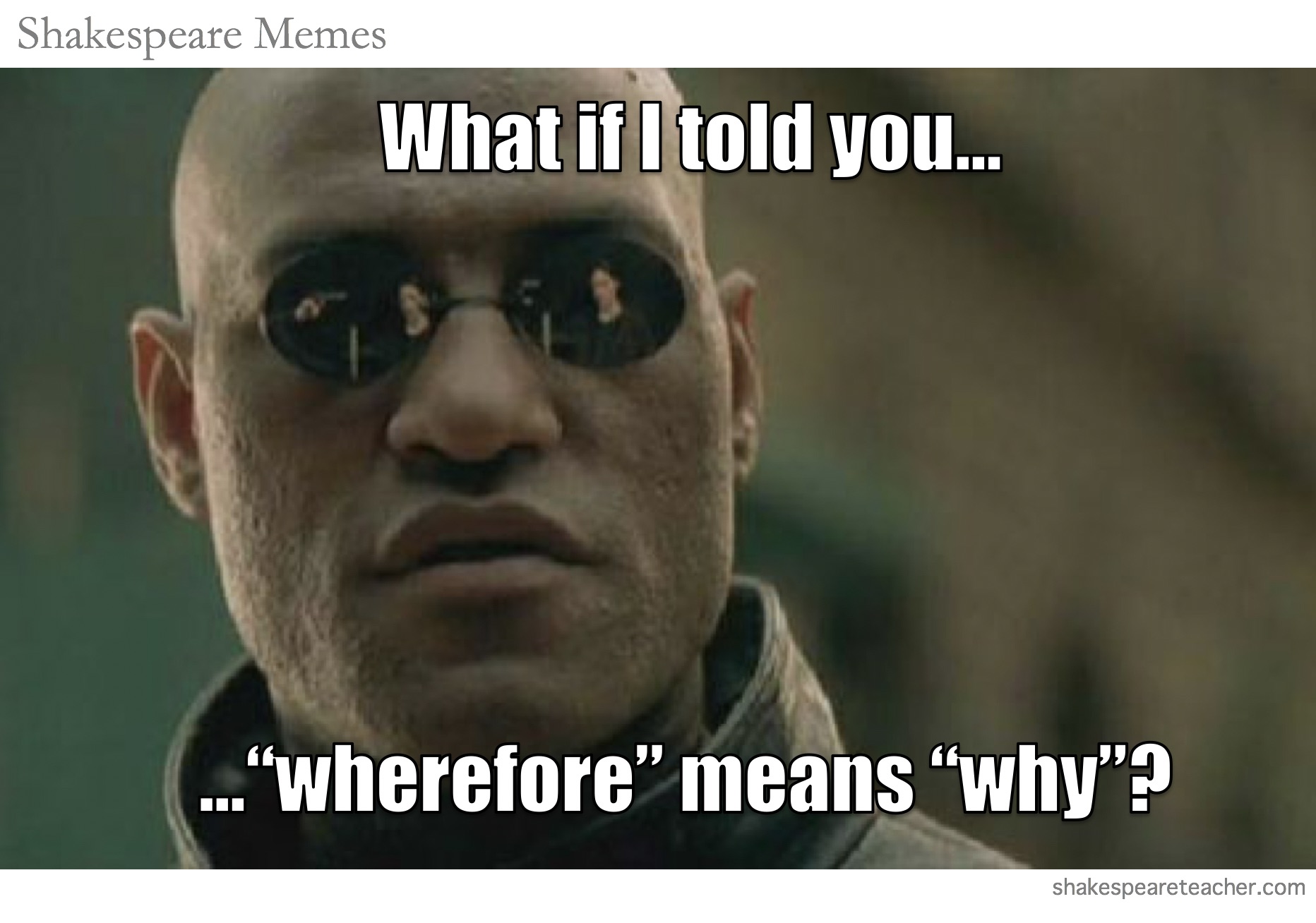
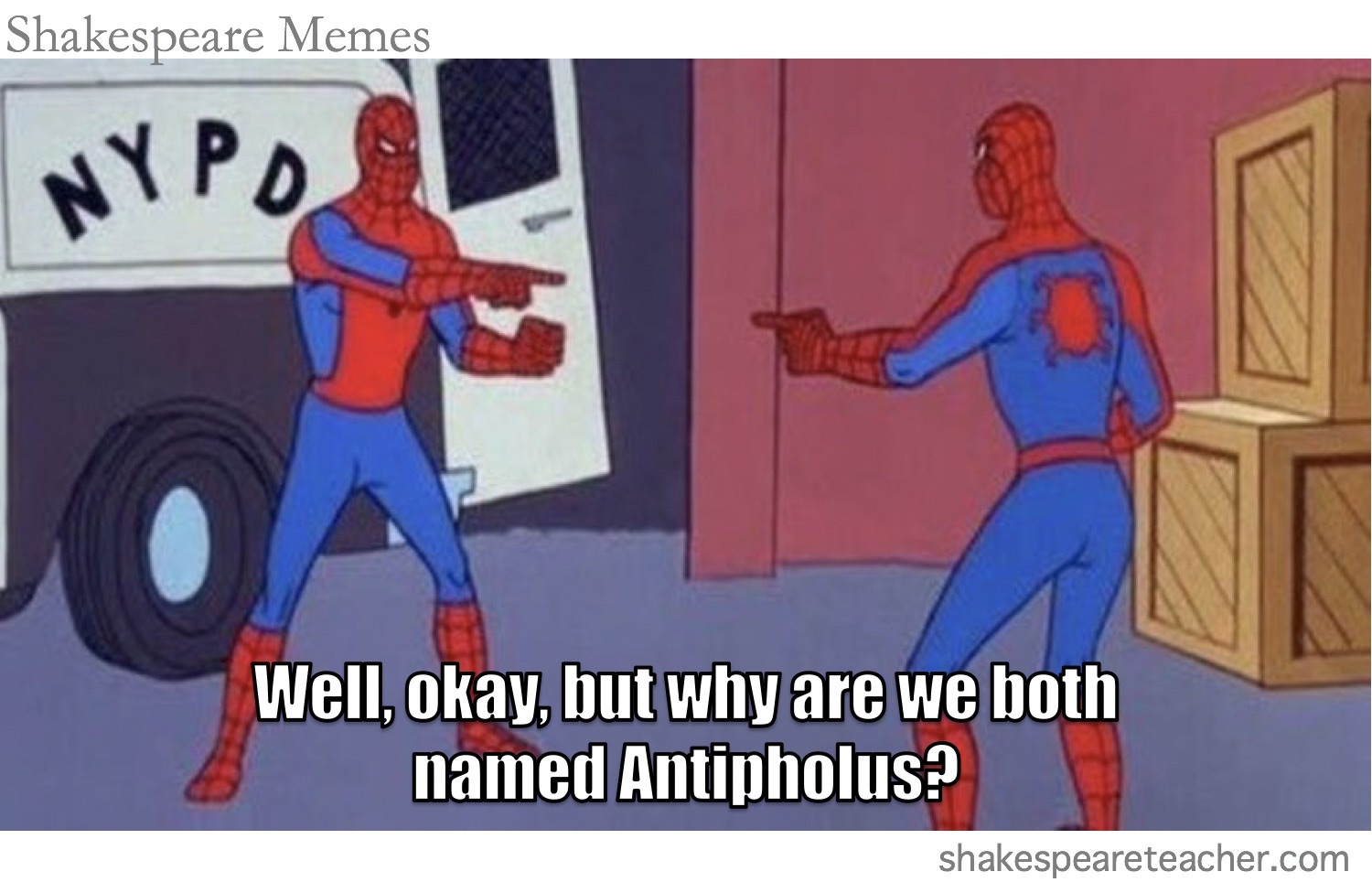
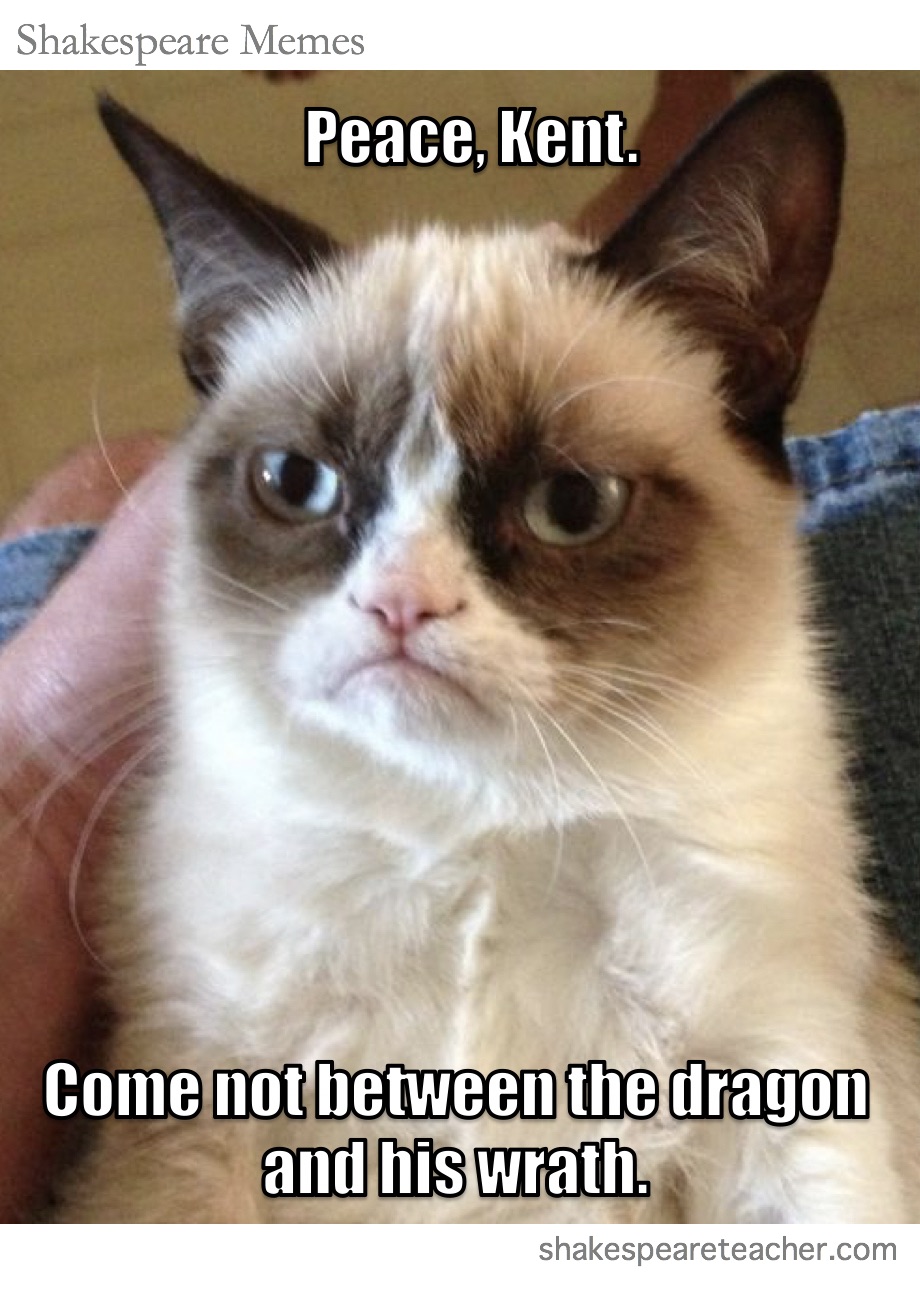
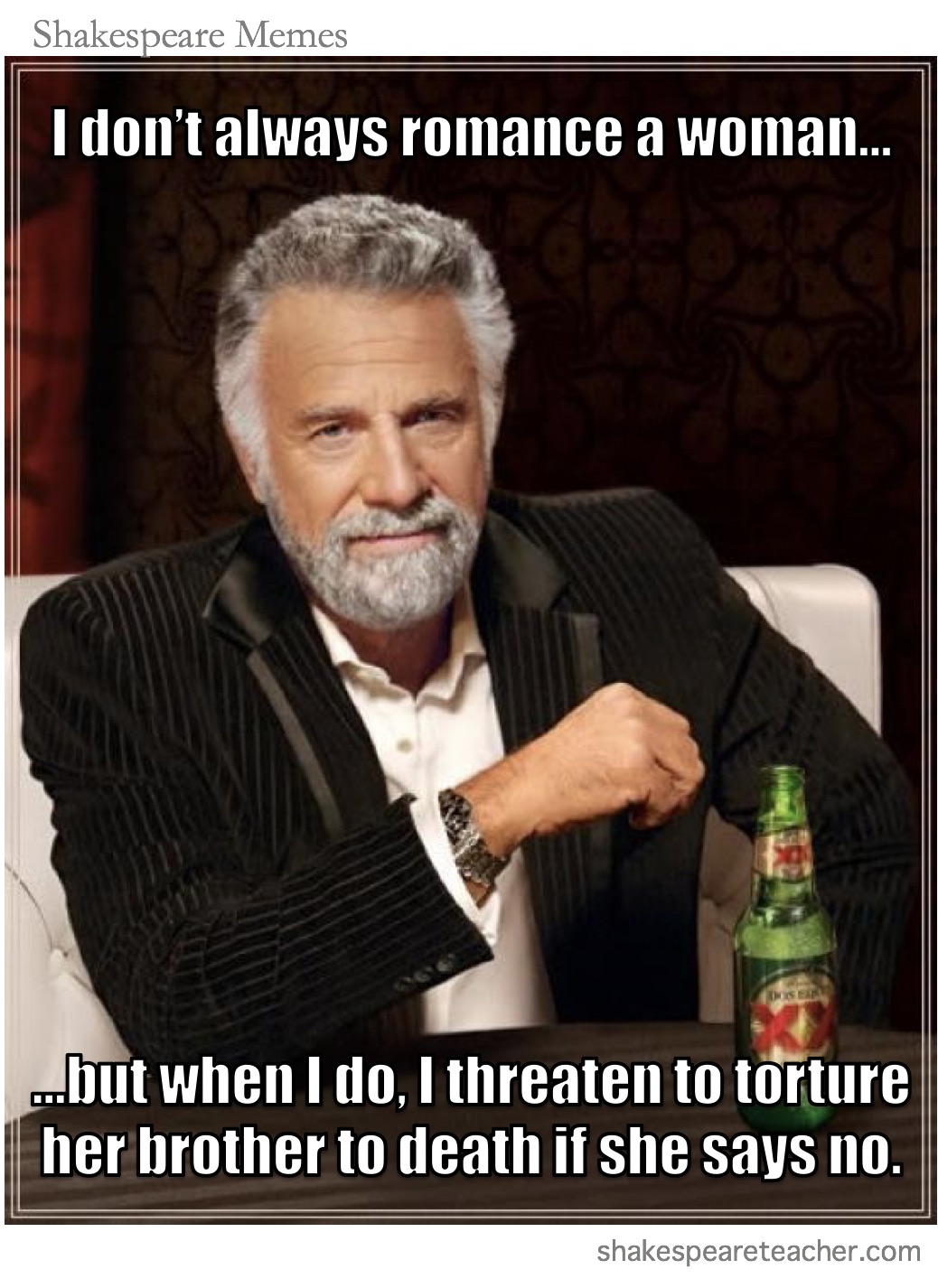
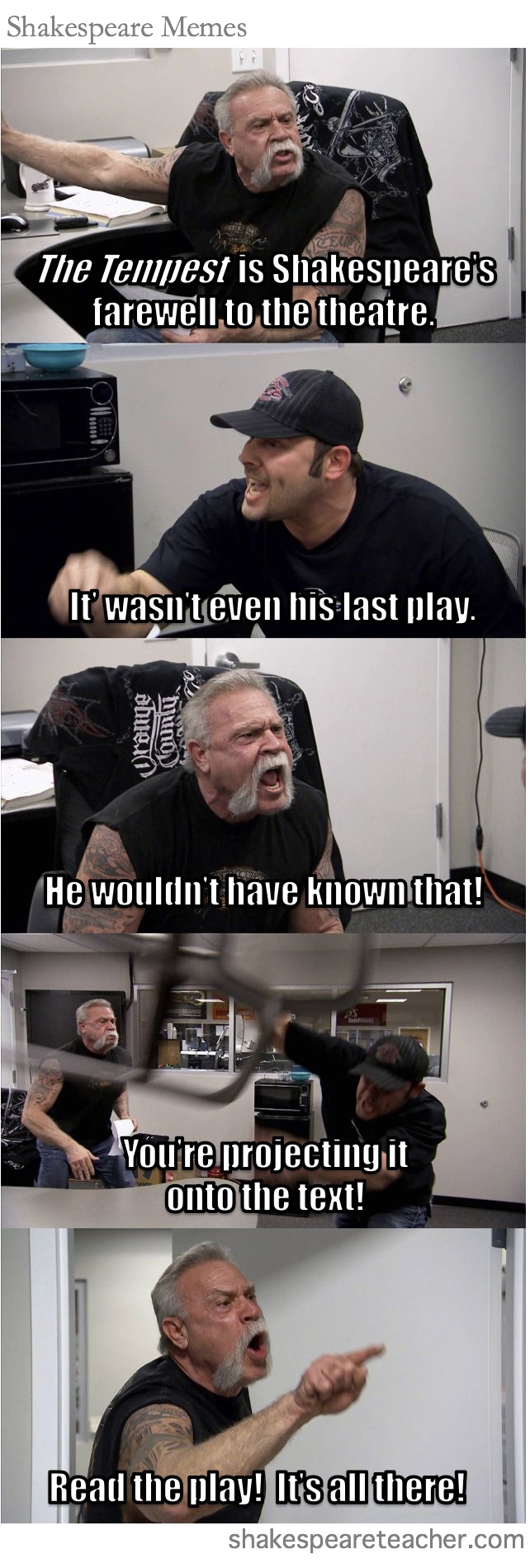
Happy 455th Birthday to Shakespeare!
In honor of the occasion, I present… Shakespeare Memes!















From The Tempest:
Misery acquaints a man with strange bedfellows.
Shift around the letters, and it becomes:
A Russian agent swiftly scammed the below-IQ NRA.
In this October 2016 TED talk, Shakespearean actor and educator Rob Crisell makes a passionate argument for Shakespeare, for teaching Shakespeare, and for teaching Shakespeare through performance. Whether you’re already with him on these three points or not, it’s well worth checking out:
The term “nature vs. nurture” is a poetic turn of phrase that refers to an ongoing reexamination of the roles that heredity and environment play in determining who we are as individuals. The expression was popularized in the 19th century by Francis Galton, though the debate and the phrase had been around much longer than his day. In fact, Shakespeare himself juxtaposed the two words in The Tempest, as Prospero describes Caliban thusly:
A devil, a born devil, on whose nature
Nurture can never stick;
Shakespeare was not the first to contrast these two words, but Galton is known to have been a Shakespeare fan, and it seems reasonable to imagine this was his source.
Shakespeare’s plays are filled with models of the intricate workings of human nature, depictions of how individuals are influenced by external factors, and the complicated interplay between the two. As we will soon see, Shakespeare was also an early voice in this conversation, and an often-quoted source by later thinkers as well. Therefore, our Shakespeare Follow-Up will focus on the development of the nature vs. nurture debate from Shakespeare’s time to ours today.
But please note that this is a very large topic, and I’m going to sweep through it rather quickly, so feel free to do your own follow up on any topic here that interests you.
Political philosophers such as Hobbes, Locke, and Rousseau are often grouped together as “social contract theorists,” because they presented ideas about how and why humans form societies. But when considering their impact on the nature/nurture question, it’s more illustrative to focus on their differences.
In Leviathan (1651), Thomas Hobbes argued that human beings, existing in a state of nature, are savage and brutal. Therefore, we willingly surrender our autonomy to a sovereign unconditionally in order to gain security from our murderous brethren. John Locke, in An Essay Concerning Human Understanding (1689), lays out the idea that we refer to today as tabula rasa, or “the blank slate.” Rather than seeing human beings as being innately evil, as Hobbes does, he sees us as being neither good nor evil naturally, but rather open to influence from our environments. Jean-Jacques Rousseau presents a different view of the natural state of the human in his book Émile (1762). For Rousseau, humans are born innately good, and it is society that corrupts.
Naturally, the choice of which of these three views to adopt will have a profound effect on how a culture views education and child rearing. We can’t control the nature, but we can structure the nurture to make the best use of our understanding of it. If we believe that human beings are born evil, we’ll want to make discipline the backbone of our educational system. If we believe that children are blank slates, we’ll seek to fill those slates with our best models for citizenship and morality. If we believe that our students are innately good, then maybe the best thing we could do would be to just get out of the way and let them explore the world they find themselves in. You can hear echoes of these debates in today’s conversations about education.
In the post-Darwinian era, psychologists began to codify the progression of human development into various stages. The progression was determined by nature, but profoundly impacted by environment. Sigmund Freud described five psycho-sexual stages of development in childhood. The eight psycho-social stages outlined by Erik Erikson were strongly influenced by Freud, but extended to adulthood.
But wait! A lifetime of human progression divided into stages? Why does that sound familiar? Oh right…
All the world’s a stage,
And all the men and women merely players:
They have their exits and their entrances;
And one man in his time plays many parts,
His acts being seven ages. At first the infant,
Mewling and puking in the nurse’s arms.
And then the whining school-boy, with his satchel,
And shining morning face, creeping like snail
Unwillingly to school. And then the lover,
Sighing like furnace, with a woful ballad
Made to his mistress’ eyebrow. Then a soldier,
Full of strange oaths, and bearded like the pard,
Jealous in honour, sudden and quick in quarrel,
Seeking the bubble reputation
Even in the cannon’s mouth. And then the justice,
In fair round belly with good capon lin’d,
With eyes severe, and beard of formal cut,
Full of wise saws and modern instances;
And so he plays his part. The sixth age shifts
Into the lean and slipper’d pantaloon,
With spectacles on nose and pouch on side,
His youthful hose well sav’d, a world too wide
For his shrunk shank; and his big manly voice,
Turning again toward childish treble, pipes
And whistles in his sound. Last scene of all,
That ends this strange eventful history,
Is second childishness and mere oblivion,
Sans teeth, sans eyes, sans taste, sans everything.
It seems that Jacques in As You Like It was on the right track, centuries ahead of his time. Freud famously wrote about Hamlet, and Erikson even cites Shakespeare’s “ages of man” in his 1962 article “Youth: Fidelity and Diversity,” which also provides an in-depth discussion of Hamlet.
Jean Piaget (1896-1980) developed a set of four stages of cognitive development that have been profoundly influential in our understanding of human nature. Piaget believed that these stages developed naturally, and that new levels of learning become possible at each stage. Score one point for nature! Lev Vygotsky (1896 – 1934) built on these ideas, but demonstrated that learning could actually encourage cognitive development. There is a zone between what students are capable of doing on their own and what they can do in an environment that includes guidance and collaboration. Stretching into this zone can assist children in progressing developmentally. There’s one point for nurture, and it’s a tie game.
In fact, it will always be a tie game. Everyone agrees that both nature and nurture are significant, and we can argue about various degrees. Noam Chomsky (1928 – ) revolutionized the field of linguistics by describing, in Syntactic Structures (1957), the innate ability of the human brain to acquire language. This was a challenge to the behaviorist philosophy that was dominant at the time. In Frames of Mind (1983), Howard Gardner describes a system of multiple intelligences that different people seem to possess in different measures. The rise of theories such as Chomsky’s and Gardner’s would seem to move the needle towards nature, but the fact that they continue to influence our educational practices demonstrate the importance of nurture in the equation all the more powerfully.
Shakespeare, of course, didn’t know any of this. Nevertheless, his understanding of the complex interplay between nature and nurture was nuanced enough for him to create models that still have us debating the actions and motivations of fictional characters as though they were real people. Why, for example, does Macbeth kill Duncan? Is it because he’s ambitious? Or does he succumb to pressure from his wife? If it’s the former, would he have done so without prompting from the witches? And if it’s the latter, what elements of his nature make him susceptible to his wife’s influence?
I give up. What do you think, Lady Macbeth?
Glamis thou art, and Cawdor; and shalt be
What thou art promis’d. Yet do I fear thy nature;
It is too full o’ the milk of human kindness
To catch the nearest way; thou wouldst be great,
Art not without ambition, but without
The illness should attend it; what thou wouldst highly,
That thou wouldst holily; wouldst not play false,
And yet wouldst wrongly win; thou’dst have, great Glamis,
That which cries, ‘Thus thou must do, if thou have it;’
And that which rather thou dost fear to do
Than wishest should be undone. Hie thee hither,
That I may pour my spirits in thine ear,
And chastise with the valour of my tongue
All that impedes thee from the golden round,
Which fate and metaphysical aid doth seem
To have thee crown’d withal.
A lot of these Follow-Ups are about how much Shakespeare didn’t know. This one is about how much he still has to teach us.
This is the last in a series of 40 pop-music parodies for Shakespeare fans.
So far, we’ve had one parody for each of Shakespeare’s 38 plays and one for the sonnets. We finish the Shakespeare Top 40 with a tribute to all of the plays, one last time.
Enjoy!
We Love the Plays of Shakespeare
sung to the tune of “We Didn’t Start the Fire” by Billy Joel(With appreciation to everyone who has followed along on the journey…)
Harry, Suffolk, Somerset,
Richard Plantagenet;
Warwick, Edward, Margaret, Rutland,
Younger Lord Clifford;
Lord John Talbot, Tony Woodeville,
Duke of Bedford, Joan La Pucelle;
Duke of Clarence, Tower Princes,
Richard the Third…Antipholus, Dromio,
Balthazar, Angelo;
Titus gets Tamora by
Baking her kids in a pie;
Tranio, Petruchio,
Katharina, Widow;
Proteus and Valentine have
Bid Verona goodbye…We love the plays of Shakespeare,
Jumping off the pages,
Burning up the stages.
We love the plays of Shakespeare.
First, we learned to read them.
Now, we go to see them.
Don Armado, French Princess,
Costard and Holofernes;
Romeo’s Apothecary,
Juliet’s Nurse;
Gaunt John, he passed on,
Henry’s back and Dick’s gone;
Quince, Flute, Snout, Snug,
Bottom’s got a curse…King John, Pope, France,
Bastard’s got a second chance;
Shylock and Antonio,
Portia and Bassanio;
Bardolph, Boar’s Head,
Prince Hal, Hotspur dead;
Tavern Hostess, Lord Chief Justice,
Henry on his deathbed…We love the plays of Shakespeare,
Jumping off the pages,
Burning up the stages.
We love the plays of Shakespeare.
First, we learned to read them.
Now, we go to see them.
Benedick, Beatrice,
Dogberry and Verges;
Cambridge, Scroop and Grey,
Fight on St. Crispin’s Day;
Cassius, Cicero,
Julius Caesar, Cato;
Duke Senior, Jacques,
Poems posted on the trees…O, O, O…
Olivia, Antonio,
Toby Belch, Malvolio;
Ophelia, Claudius,
Hamlet kills Polonius;
Falstaff once adored
Mistress Page and Mistress Ford;
Agamemnon, Pandarus,
Cressida and Troilus…We love the plays of Shakespeare,
Jumping off the pages,
Burning up the stages.
We love the plays of Shakespeare.
First, we learned to read them.
Now, we go to see them.
Helena for Bertram fell,
All’s Well that Ends Well;
Angelo, Claudio,
“Friar” Duke Vincentio;
Desdemona, Othello,
Duke, Iago, Cassio;
Kent’s stand, Lear’s Fool,
Edmund’s death, Edgar’s rule;
Three Witches, two Macbeths,
Scottish spirits come unsex;
Antony, Cleo P.,
Who else would you want to see?We love the plays of Shakespeare,
Jumping off the pages,
Burning up the stages.
We love the plays of Shakespeare.
First, we learned to read them.
Now, we go to see them.
Marcius, Cominius,
Volumnia, Aufidius;
Cupid, Lucius,
Timon, Flavius;
Gower, Thaliard, Pericles,
Antiochus, Simonides;
Posthumous is shipped to Rome,
Iachimo’s gone to his home…Autolycus, Leontes,
Perdita, Polixenes;
Stephano, Trinculo,
Ship, wreck, Prospero;
Henry starts a second life,
Anne Boleyn’s his second wife;
Kinsmen our guy partnered for;
May have helped with Thomas More…We love the plays of Shakespeare,
Jumping off the pages,
Burning up the stages.
We love the plays of Shakespeare.
And where we have gone,
The play will start anon,
Anon, anon, anon, anon, anon, anon, anon…We love the plays of Shakespeare,
Jumping off the pages,
Burning up the stages.
We love the plays of Shakespeare.
First, we learned to read them.
Now, we go to see them.We love the plays of Shakespeare!
Hat tip to Shakespeare Online for the chronology.
You can click to read all 40 song parodies here.
This is the 39th in a series of 40 pop-music parodies for Shakespeare fans.
Enjoy!
I Have Won
sung to the tune of “We Are Young”(With apologies to Fun and Janelle Monáe)
Give me a second, I
I need to get my vengeance straight:
The steward and the fool have
Drunk more wine than they have body weight,
My brother he is washed ashore
With others just as bad,
The kid is being led by Ariel
Singing about his dad, and
I know they all betrayed me years ago.
I can forgive but not forget.
So I made a storm and food transform
With magical technologies, you know,
It’s not so hard to pay them back.
But by six in the evening
When the sun is going down,
I’ll let it all go.This fight
I have won,
For the crime that was my brother’s,
And for the others;
What they’ve done!This fight
I have won,
For the crime that was my brother’s,
And for the others;
What they’ve done!Now, don’t tell me you’d not
Deserve more than you got.
I guess that I, I just thought
Maybe I could show you how to have a heart.
Though I paid you back,
I showed mercy most,
And now it’s time to let it all go.This fight
I have won,
For the crime that was my brother’s,
And for the others;
What they’ve done!This fight
I have won,
For the crime that was my brother’s,
And for the others;
What they’ve done!But by six in the evening
When the sun is going down,
I’ll let it all go: this fight.
Don’t worry if you don’t know what a retrochronism is. I just made the word up. But feel free to throw it around at the dinner table and the water cooler; it’s a thing now.
Let’s say an author from an earlier time period uses a term in a sense that’s appropriate to that author’s time period. Then, the author dies and the language evolves. New technologies are invented. Culture shifts. Later readers or audiences then interpret the term as used by the author through the lens of their own time period, and incorrectly think it means something entirely different from what the author could have possibly intended. That’s a retrochronism!
This is not to be confused with an anachronism, a term generally used to describe instances where an author uses something from his own time in a work that is set before that thing would have been possible or appropriate. Shakespeare has many such anachronisms, such as the clock striking in Julius Caesar. But a retrochronism is different. It isn’t a mistake by the author; it’s an accident of history.
We’ve had 400 years now to develop a few good examples for Shakespeare. The quintessential example is from Romeo and Juliet:
JULIET: O Romeo, Romeo! wherefore art thou Romeo?
Most readers of this blog probably know that “wherefore” means “why” and not “where.” But this is far from obvious, and many newcomers to Shakespeare, entering his world through this play, assume she’s searching for him from her balcony. Who says “wherefore” anymore?
Another common example can be found in Hamlet:
HAMLET: Madam, how like you this play?
QUEEN: The lady doth protest too much, methinks.
HAMLET: O! but she’ll keep her word.
In Shakespeare’s time, “protest” meant to promise. But today we think of it in the opposite sense of a denial. So when people quote the line, they often mean that a person is denying something so much that it must be true. But Gertrude meant that the lady was promising so much that it must be false!
Those two examples are probably the most well known, but below are my ten favorites, culled from years of introducing kids to Shakespeare and from my own journey of working through the language.
TEN. Was Doll Tearsheet a One-Percenter?
DOLL: A captain! God’s light, these villains will make the word captain as odious as the word ‘occupy,’ which was an excellent good word before it was ill sorted: therefore captains had need look to it.
Playgoers who have attended productions of Henry IV, Part Two in the past year must have been taken aback by this statement, possibly even suspecting editorial interference for political purposes.
But in Shakespeare’s time, the word “occupy” was slang for having sex with someone. It’s enough to make you wonder what was really going on at Zuccotti Park after hours.
NINE. Did the Witches prophesy Kitty Hawk?
FIRST WITCH: Here I have a pilot’s thumb,
Wrack’d as homeward he did come.
Most modern audiences are familiar with the word “pilot” as meaning someone who flies an airplane, obviously not what Shakespeare meant in Macbeth.
The word “pilot” meant (and still means) someone who steers a ship.
EIGHT. Was Lord Capulet a pimp?
CAPULET: What noise is this? Give me my long sword, ho!
Here is one that comes up often when working with kids; this example from Romeo and Juliet is as good as any. Shakespeare had a lot of words for “prostitute,” but “ho” was not among them.
If you bring your voice up on the word, it’s an antiquated expression of zeal. If you bring it down, it’s a contemporary form of derisive address. Voices up, please.
SEVEN. Was Bottom a Lea Michele fan?
BOTTOM: Nay, I can gleek upon occasion.
Folks who are “Glee Geeks” might enjoy imagining Nick Bottom from A Midsummer Night’s Dream as one of them. He admitted he can “gleek” after all.
Sure, I’m being a little silly with this one, but why not? “Gleek” means to joke around.
SIX. Did Olivia have some work done?
OLIVIA: We will draw the curtain and show you the picture. [Unveiling.] Look you, sir, such a one I was as this present: is’t not well done?
VIOLA: Excellently done, if God did all.
OLIVIA: ’Tis in grain, sir; ’twill endure wind and weather.
Viola’s quip “if God did all” can set a Twelfth Night audience roaring if delivered just so. Does Viola suspect a little Nip/Tuck help is behind Olivia’s epic beauty?
Don’t start fitting Dr. 90210 for a doublet and hose just yet. Viola is merely making a reference to cosmetics.
FIVE. Was Hamlet a fan of Wayne’s World?
HAMLET: I did love thee once.
OPHELIA: Indeed, my lord, you made me believe so.
HAMLET: You should not have believed me; for virtue cannot so inoculate our old stock but we shall relish of it: I loved you not.
Again, this one came from the kids, though it was more common back in the ’90’s, when Wayne and Garth had more of an effect on the language.
Think of the line from Hamlet (and similar lines throughout the canon) as being delivered like this: “I loved you… NOT!” Yeah, they really used to do that… I kid you not.
FOUR. Was Feste creating a hostile work environment?
MARIA: Nay, either tell me where thou hast been, or I will not open my lips so wide as a bristle may enter in way of thy excuse. My lady will hang thee for thy absence.
CLOWN: Let her hang me: he that is well hanged in this world needs to fear no colours.
MARIA: Make that good.
CLOWN: He shall see none to fear.
Well hanged? Oh, no he didn’t!
Well, no he didn’t. It’s usually a safe bet to assume that any possible sexual innuendo was intended by Shakespeare, but Twelfth Night pre-dates the earliest known uses of the expression “well hung” to refer to a generous anatomical endowment. Plus, in the next line, Feste makes it clear he’s literally referring to a hanging. If the sexual pun were intended, why would Shakespeare have backed off the joke?
THREE. Did Ariel suffer from low self-esteem?
ARIEL: Where the bee sucks, there suck I.
Ouch. It’s not hard to convince high-school students that Shakespeare’s characters do, in fact, suck. But would Shakespeare have said so in The Tempest?
No. Bees, you see… eh, go ask your father.
TWO. Did the Porter invent a new art form?
PORTER: Knock, knock! Who’s there i’ the other devil’s name! Faith, here’s an equivocator, that could swear in both the scales against either scale; who committed treason enough for God’s sake, yet could not equivocate to heaven: O! come in, equivocator.
Rather than answering the knocking at the door, the Porter from Macbeth imagines himself as the Porter at the gates of Hell, and does some schtick about the various characters he might meet in that position. The expression “Knock Knock, Who’s there” is used to introduce new characters in his standup routine.
But if you’re expecting him to answer “Ophelia,” you’re going to have a long wait. The Knock-Knock joke as we know it is a twentieth-century creation.
ONE. Is Dromio of Syracuse a pothead?
DROMIO S: I am transformed, master, am not I?
ANTIPHOLOUS S: I think thou art, in mind, and so am I.
DROMIO S: Nay, master, both in mind and in my shape.
ANTIPHOLOUS S: Thou hast thine own form.
DROMIO S: No, I am an ape.
LUCIANA: If thou art chang’d to aught, ’tis to an ass.
DROMIO S: ’Tis true; she rides me and I long for grass.
Zing! Dromio’s jonesing for some weed! The Comedy of Errors is a drug play!
But not really. Dromio just longs for the freedom of greener pastures. Grass means grass, baby. However, the “she rides me” part probably does mean what you think it means.
So those are my ten favorite retrochronisms from Shakespeare. Did I miss any? Feel free to add to the list!
I was surprised to see that my local theatre was showing a movie version of The Tempest with Christopher Plummer as Prospero. I was unaware that there was such a film, and this is kind of my thing.
It turned out to be a filmed version of a stage production from the Stratford Festival in Canada. I’ve seen stage plays captured on film before, and with good effect, but never in an actual movie theatre, and this was unlike any other such film I had ever seen. Footage was taken from two different performances in front of live audiences. They used 10 different cameras, so they really were able to cut from scene to scene in a very cinematic way. And the actors were all miked for the film, not the audience, so the sound quality was immaculate.
I have to admit that the immediate effect was somewhat jarring. After the opening storm scene (which is meant to be jarring) we have the scene where Prospero gives the exposition to his daughter Miranda and the audience. Here we see the effect of imposing close-ups on a medium that wasn’t designed for it. We hear and see actors emoting and projecting for an 1800-seat theatre, but right up close and personal on the big screen. This took some getting used to, but once my eyes adjusted, the artifice disappeared, belief was once again willingly suspended, and we were left with just the story.
There is a difference between seeing a stage production and a movie, and ultimately this was more like seeing the stage production. There are so many opportunities to have digitally-enhanced special effects in movies, but we quickly become jaded to these. The better the effect, the more invisible it becomes over time. However, in the theatre, the opposite is true. The magic of the stage has a much greater chance to be awe-inspiring, and this effect was preserved even as we know what we’re watching has been filmed. Just as in the theatre, we could see stagehands striking set pieces and the stage revolving to create wonderful illusions. The theatre requires much more of the audience than films do, and knowing that we are in on creating the illusion through our belief is part of the fun. Whether we’re being asked by Shakespeare to “piece out our imperfections with your thoughts” or by Peter Pan to clap for Tinkerbell, there is an actor-audience dynamic that loses something when the two don’t share the same space.
So, I was very conscious of the fact that I was watching this performance with two different audiences. First, the Stratford audience was visible and audible in the movie, which added a great deal. But there was also the audience that I was part of, sitting in an air conditioned movie theatre on a warm Sunday afternoon. The stage audience was quite often laughing and clapping along with the performance, while we in the cinema audience rarely were. And as much as I was appreciating the audience response, perhaps even needing it, it served as a constant reminder that I was one step removed from the living space. I was an audience to an audience, vicariously living out the theatrical moment.
Nevertheless, I had a transformative experience, and that’s not something I get to have too often these days. Frankly, The Tempest has never been one of my favorite plays. But as I was sitting there watching this amazing production, it occurred to me that I could not remember actually having ever seen a stage production of it. I’ve read it, held readings of it, taught it… I even led a 7th-grade class in creating a half-hour animated musical production of it, for which I edited the script. But never having seen it the way Shakespeare was meant to be performed, as they say, I never fully appreciated it until now. So maybe some of the magical fairy dust was able to find its way into the movie house after all. I do believe in fairies. I do!
Gerant-Wyn Davies stole the show as Stephano, and his scenes with Bruce Dow’s Trinculo and Dion Johnstone’s Caliban were laugh-out-loud funny. I loved the music, particularly the goddesses singing, which was a masterpiece of theatrical spectacle. Julyana Soelistyo was delightful as a spritely Ariel. And, of course, Plummer was magnificent as Prospero, drawing me into his world as though I were just another one of his hapless victims. His delivery of the most famous Prospero speeches, no more than overly familiar words to me, made me understand why they became so famous in the first place. When he finally said “I’ll drown my book” you could feel the deep sense of loss for him. I can’t say what Shakespeare had in mind, but someone was definitely saying farewell to something that was deeply profound and meaningful to him.
And, as though you hadn’t already gotten your $18 worth, there is a bonus at the end. After the play is over, the movie continues with a Q&A featuring director Des McAnuff and Plummer taking questions from the show’s producer and an audience who had viewed the film. Plummer was witty and charming, especially delighting in taking wry pot-shots at Anonymous without ever mentioning it by name. They also discuss the challenges of interpreting a stage production for the screen and some of what they’ve learned about working with The Tempest.
I don’t know how much longer this movie will be in theatres, but if you can’t see it on the big screen, it will definitely be worth checking out on a smaller screen near you.
In Shakespeare’s time, people did not go to “see” a play; they went to “hear” a play. Which Shakespeare play would you like to hear?
A few months ago, I wrote a post about my Shakespeare addiction that referenced the Caedmon audio production of As You Like It. Regular readers of the blog know well the extent of this addiction, but what they may not know is the degree to which that addiction includes audio productions of Shakespeare. Most people organize their mp3 playlists with different genres of music plus one “Spoken Word” category. My iPhone has a “Music” playlist, with various Spoken Word sub-genres, including several playlists of performances of Shakespeare. Given the hours upon hours I have spent listening to these productions, I am now pleased to share with you my ten very favorite selections.
Now, if this is your thing, you really need to get The Complete Arkangel Shakespeare. This is a breathtaking collection of top-quality productions of each of Shakespeare’s plays, directed by Clive Brill and with original music by Dominique Le Gendre. The advantage of buying the set is that you will then have the option to listen to any title you choose. But if you’re not ready to make that kind of investment into the eclectic world of Shakespeare audio, I can give you my own top picks so you can get your feet wet before diving into the deep end of the pool.
Standard disclaimers apply. These are based on my own preferences, which are always subject to change. I based my rankings on writing, acting, directing, production, and music. I limited myself to modern productions only, so you won’t find Paul Robeson or Orson Welles on the list. And I’m sure there are many excellent productions I haven’t listened to. Basically, these are the ten audio productions of Shakespeare I find myself returning to again and again.
And, in keeping with tradition, my top ten list will have twenty entries. Enjoy!
Directed by Glyn Dearman; Starring Sir John Gielgud (Lear), Kenneth Branagh (Edmund), Emma Thompson (Cordelia), Derek Jacobi (France), Bob Hoskins (Oswald), Judi Dench (Goneril), Michael Williams (Fool), and Richard Briers (Gloucester).
This, to me, is the definitive audio Lear. Gielgud takes a larger-than-life character and truly brings out his humanity. An all-star cast delivers solid performances across the ensemble. This is Shakespeare the way it was meant to be performed.
Vanessa Redgrave as Rosalind gives one of the greatest audio performances I’ve ever heard. If you’re a fan of the play, or even if you’re not, you owe it to yourself to hear this amazing production.
Starring Kenneth Branagh (Richard III), Celia Imrie (Queen Elizabeth), Bruce Alexander (Edward IV), Michael Maloney (Clarence), John Shrapnel (Hastings), Stella Gonet (Anne), Jamie Glover (Richmond), and Nicholas Farrell (Buckingham).
I wouldn’t really have thought of Branagh for the hunchbacked villain, but he does a great job leading a top-notch cast in performing Shakespeare’s classic history play. I never really knew how much was going on in this play until I heard this production.
Starring Michael Feast (Julius Caesar), John Bowe (Brutus), Adrian Lester (Mark Antony), Geoffrey Whitehead (Cassius), Estelle Kohler (Portia), and Jonathan Tayler (Octavius).
I can listen to this one again and again. The exchanges between Bowe’s Brutus and Whitehead’s Cassius are electric, and Marc Antony’s powerful monologues are explosive in Lester’s more-than-capable hands.
5. The Comedy of Errors (Arkangel)
Starring David Tennant (Antipholus of Syracuse), Brendan Coyle (Antipholus of Ephesus), Alan Cox (Dromio of Syracuse), Jason O’Mara (Dromio of Ephesus), Niamh Cusack (Adriana), Sorcha Cusack (Luciana), and Trevor Peacock (Egeon).
Along his path to directing the canon, Clive Brill has a lot of fun with Shakespeare’s only slapstick comedy. Silly sound effects and comical music underscore fantastic comic performances by a brilliant cast. Remember, dying is easy; Comedy‘s hard.
Starring Michael Feast (King John), Eileen Atkins (Constance), Michael Maloney (Bastard), Geoffrey Whitehead (Phillip), Trevor Peacock (Hubert), Bill Nighy (Pandulph), and Margaret Robertson (Elinor).
Michael Maloney steals this particular show, as the Bastard often does in King John. But strong performances across the cast have the power to churn the blood and tug a few heartstrings as well.
There are a number of audio Macbeths to choose from, but I give Anthony Quayle pride of place. Mood-enhancing sound effects and strong performances across the board make this production the Macbeth of choice.
Starring Hugh Quarshie (Othello), Anton Lesser (Iago), Emma Fielding (Desdemona).
Lesser’s edgy voice creates a dangerous Iago, who provokes a genuine sense of menace. Quarshie’s passionate Othello makes for a worthy tragic figure. Together, the two performances leave us with an unforgettable audio experience.
Directed by David Timson; Starring Samuel West as Henry V.
This is a stirring and creative production of Henry V. Vibrant interpretations of even the minor characters make for a consistently interesting and entertaining presentation of the well-beloved history.
Starring Niamh Cusak (Rosalind), Stephen Mangan (Orlando), Gerard Murphy (Jaques), Clarence Smith (Touchstone), and Victoria Hamilton (Celia).
This is a really great audio production of the play. I rated the other version much higher, but I actually prefer Dominique Le Gendre’s music in this one. And for As You Like It, the music is no insignificant character.
11. Measure for Measure (Arkangel)
Starring Roger Allan (Duke), Simon Russell Beale (Angelo), Stella Gonet (Isabella), Jonathan Firth (Claudio), and Stephen Mangan (Lucio).
Here’s another one I keep revisiting. Beale and Gonet create sparks as Angelo and Isabella, Mangan is brilliant as Lucio, and Allan’s Duke never lets you forget who’s in charge. I think I want to go listen to this one right now.
Starring Paul Scofield (Lear), Alec McCowen (Gloucester), Kenneth Branagh (Fool), David Burke (Kent), Harriet Walter (Goneril), Emilia Fox (Cordelia), Sara Kestelman (Regan), Richard McCabe (Edgar), and Toby Stephens (Edmund).
Okay, so Paul Scofield as Lear should be enough, right? But he is supported by a great ensemble cast in a well-directed version of one of the greatest plays ever written. Check it out!
Starring Ian McKellen (Prospero), Scott Handy (Ariel), Emilia Fox (Miranda), Neville Jason (Antonio), Benedict Cumberbatch (Ferdinand), and Ben Onwukwe (Caliban).
Okay, so Ian McKellen as Prospero should be enough, right? But this is another high-quality Naxos masterpiece – a must-have for Shakespeare audio collectors.
14. Henry IV, Part One (Arkangel)
Starring Jamie Glover (Hal), Julian Glover (Henry IV), Alan Cox (Hotspur), and Richard Griffiths (Falstaff).
I really love this play, and the Arkangel production does it great justice. Griffiths creates a Falstaff with his voice that has the power to rival his stage counterparts. Each scene in this production is like a little gift-wrapped present.
Anton Lesser is the man! This time, he lends his distinctive voice to the Melancholy Dane, striking just the right balance between contemplative and bitter, between witty and mad. There are certainly other audio Hamlets, but Lesser is greater!
16. A Midsummer Night’s Dream (Naxos)
Starring Warren Mitchell (Bottom), Michael Maloney (Oberon), Sarah Woodward (Titania), Jack Ellis (Theseus), Benjamin Soames (Lysander), Jamie Glover (Demetrius), Cathy Sara (Hermia), Emily Raymond (Helena), and Ian Hughes (Puck).
Again, I have several versions of the Dream to choose from, but I think I’ll take Naxos for the win. I’ve heard these words so many times, it’s an impressive production that can still make me laugh at them.
Starring Rupert Graves (Richard II), Julian Glover (Bolingbroke), and John Wood (John of Gaunt).
Let’s talk of Graves. (See what I did there?) He gives an outstanding performance as Richard, which is important, because – let’s face it – he does tend to go on a little.
18. Henry VI, Part Three (Arkangel)
Starring David Tennant (Henry VI), Kelly Hunter (Margaret), Clive Merrison (York), Stephen Boxer (Edward), John Bowe (Warwick), and David Troughton (Richard).
This is the beauty of the Arkangel series. You can listen to any play, any act, any scene you like. And sometimes, you just really need to hear the “paper crown” scene. When that day comes for you, this is the recording you’ll want to have.
19. Romeo and Juliet (Arkangel)
Starring Joseph Fiennes (Romeo), Maria Miles (Juliet), and Elizabeth Spriggs (Nurse).
Dominique Le Gendre’s love theme for this production becomes the theme song for the entire Arkangel series. Fiennes and Miles are wonderful, as you knew they would be. When you want to hear this play, hear this version.
Starring Stella Gonet (Viola), Jonathan Keeble (Orsino), Jane Whittenshaw (Maria), Malcolm Sinclair (Andrew), David Timson (Feste), Lucy Whybrow (Olivia), Christopher Godwin (Malvolio), and Gerard Murphy (Toby).
Well, what can I say, this is my twentieth favorite. But it’s the best of all of the Twelfth Night productions I own, and it’s a great presentation of a fun play, so why not give it a listen?
It’s time once again to check in on what searches people have done to find themselves at Shakespeare Teacher, and to respond in the name of fun and public service. All of the following searches brought people to this site in the past week.
Probably not. Antony and Cleopatra did have three children, two boys and a girl. Cleopatra also had a child, Caesarion, from Julius Caesar. (“He plough’d her, and she cropp’d.” See how classy you sound when you quote Shakespeare?) Antony also had children from four of his wives.
After Octavius Caesar conquered Egypt (the events depicted in Shakespeare’s Antony & Cleopatra) he executed Caesarion, and gave the three children of Antony and Cleopatra to his sister Octavia. Remember (from the play) that Octavia was Antony’s last wife, so she’s now raising the children of her husband and his mistress. Little is known of the two boys, and if they had lived to adulthood, they would probably have been mentioned in sources of the time because of their parentage. It is possible they may have secretly been killed to avoid a later challenge to Octavius. But it’s also possible that they lived on and had children of their own. There’s no way to know.
The daughter of Antony and Cleopatra, named Cleopatra Selene, was married to an African king, and they had – at least – great grandchildren. Zenobia, a third century Syrian queen, claimed to be descended from this line. So it’s certainly possible that the descendants of Antony and Cleopatra are among us today. And if so, the opportunities to multiply between the 1st century and the 15th century would be massive. Therefore, we cannot rule out definitively that the Tudors are descended from Antony and Cleopatra. But could they know this for sure, let alone trace it? No. Those 1400 years weren’t exactly known for their record keeping, and there is too much motivation for people to invent a famous lineage along the way.
Margaret Tudor was Henry VIII’s older sister. She married James IV of Scotland in 1503, and a hundred years later, her great-grandson would become King of England (after Henry VIII’s line died out).
However, if you are asking about the character played by Gabrielle Anwar in The Tudors, you’re really looking for younger sister Mary Tudor. Another Mary would have probably been too confusing, so they conflated the two women into one character. Mary Tudor was the one who married an aging king only to be widowed three months later. Mary was the one who married Charles Brandon. I’ve only seen the first season of the show, so I don’t know what the character would later become, but in the first season, Margaret’s story is that of Mary Tudor.

Shakespeare had a lot of plots that centered around practical jokes. Often, they would blur the line between harmless prank and vicious revenge, but you can’t make an omelette without breaking a few eggs, am I right? Without any further ado, then, is my Top Ten list of Shakespearean pranks. Drum roll, please!
10. The Merry Wives of Windsor – I’m not a fan of this play, and I’m loathe to include it on the list of Top Ten anything. But a list of Shakespearean pranks would be incomplete without it, so here it is at #10. Suffice it to say, there are a number of pranks in this play. I’d list them, but I can’t be bothered.
9. Henry IV, Part Two – Hal and Poins disguise themselves as drawers and listen in on Falstaff’s bragging. They reveal themselves, but not before Falstaff has a chance to badmouth the Prince behind his back. The fun comes when Falstaff tries to talk his way out of it.
8. Measure for Measure – The “bed trick” and the “head trick” are serious deceptions and can hardly be considered a prank. But what about what I like to call the “fled trick”? The Duke pretends to leave Vienna, but instead stays back disguised as a friar. I guess the joke’s on Angelo. Busted!
7. Twelfth Night – Malvolio, imprisoned in darkness, recieves a visit from Sir Topas the curate. Actually, it’s Feste the jester disguising his voice. Playing both parts, Feste drives the supposed madman one step closer to real madness.
6. Much Ado about Nothing – Beatrice and Benedick’s merry war takes a surprising turn when their friends allow them to overhear conversations to make each believe the other is in love. The prank becomes self-fulfilling. “Some Cupid kills with arrows, some with traps.”
5. Henry IV, Part One – Hal and Poins pretend to go along with Falstaff’s plan to rob some travellers. But they enter in disguise after the fact and rob the robbers! They reveal their prank after Falstaff has been boasting about his encounter with the unknown thieves.
4. The Tempest – Prospero uses his magic to get revenge on those who have wronged him. But the havoc only lasts the afternoon and there’s no real damage done. The whole play is one big prank.
3. A Midsummer Night’s Dream – Puck changes Bottom into an ass. And Titania, having been spiked with a love potion by Oberon, falls in love with the creature. Hilarity ensues.
2. Twelfth Night – Maria forges a letter from Olivia to Malvolio, hinting that she is in love with him. Toby, Andrew, and Fabian spy on Malvolio as he reads the letter, which tells him to come to her in an outlandish manner… and he does.
1. Othello – Iago tricks Othello into believing that his wife has been unfaithful, so he kills her. Not really a prank, you say? Check out this video.
There are a lot of good monologues for men from King Lear. To start with, you can find monologues from Lear here, from Edmund here, and Edgar here. The female characters in the play have some great speeches, but nothing I would particularly pull out as a monologue.

You may be looking for Shakespeare: The Animated Tales, a series of half-hour condensed animated versions of Shakespeare plays. But I’ve also done a lot of work with students creating animated versions of Macbeth, As You Like It, and The Tempest. And since this is Shakespeare Teacher, I’ll offer some information about how to do it.
When I did these animation projects, the students did the artwork in HyperStudio, they recorded the sound in SoundEffects, and they aligned the two in iMovie. It was frame-by-frame, which is time consuming, but HyperStudio had a card-and-stack interface that made it go much more quickly. That was quite a few years ago, though, and I do mostly video projects now. I don’t know if HyperStudio is even still around, and people use Audacity for sound recordings today. iMovie is still the best game in town if you want to coordinate frame animation.
I know a lot of people who like to use the website Scratch for student animations. The one problem with Scratch is that you can only view the animations from the Scratch website. You cannot download the movie file and post it to YouTube.
I’ve heard, particularly from Shakespeare teachers, a lot of enthusiasm surrounding Kar2ouche. I looked at it once, a long time ago, and I dismissed it because there are a lot of pre-made templates, and I wanted my students to visually interpret the characters themselves. But time being a factor, I would probably recommend it, and I’ve seen some Shakespeare projects that look really sharp. Every so often, someone asks me if I’ve heard of Kar2ouche.
Of course, if your kids are into Second Life, there has been some animated Shakespeare coming from that quarter as well. There is also stop motion photography, which can be done with a digital camera, iMovie, and a lot of patience.
I can interpret this in four ways:
1. Was Queen Elizabeth the illegitimate child of Shakespeare?
2. Was Queen Elizabeth’s illegitimate child Shakespeare?
3. Did Queen Elizabeth’s illegitimate child actually write the plays of Shakespeare?
4. Was Queen Elizabeth an illegitimate child according to Shakespeare?
Elizabeth was older than Shakespeare, so #1 is a clear No. I don’t know of any illegitimate children of Elizabeth. This seems to me to be something easier for a king to pull off than a queen. If she had gone through a pregnancy, I doubt she’d have kept the nickname “the Virgin Queen” for very long. So we can answer a No for #2 and #3 as well.
As for whether Elizabeth herself was illegitimate, that’s a fair question. It all depends on how legitimate you consider the annulment of Henry VIII and his first wife. But Shakespeare certainly wouldn’t have painted her as illegitimate. When she was alive, he wrote plays that glorified her ancestors, and long after she died, his play Henry VIII treated her birth as a moment of great hope for the future of England.
So I’m not sure what you’re asking, but the answer is probably No.
I leave the task of responding to the remaining search terms to my readers:
shakespeare reading list
headline tell us that macbeth saves Scotland
theme of religion in shakespeare’s “as you like it”
what inspired shakespeare to write king lear
how people were killed when shakespear was alive
madrid in april 2010 literature teachers